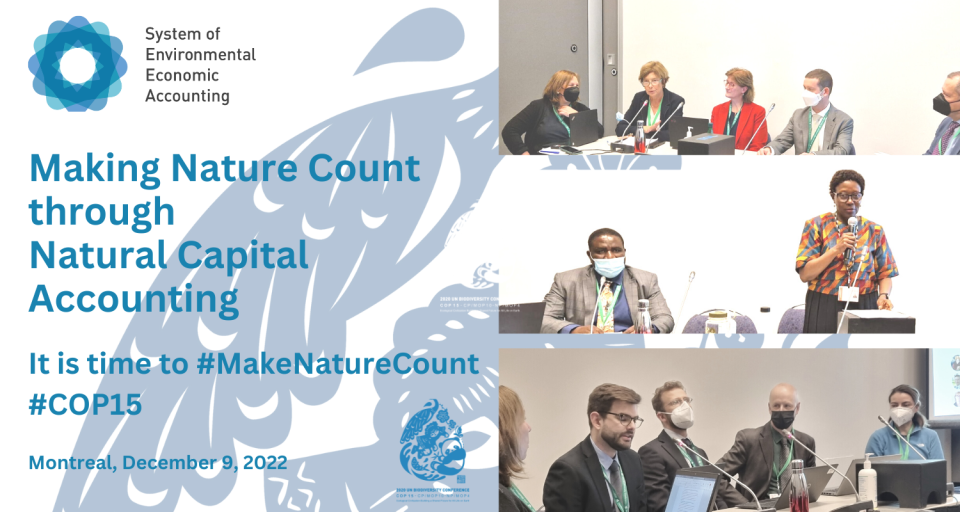Making Nature Count at the UN Biodiversity Conference (COP15)

On 9 December, over 100 participants filled the room to capacity to participate in the side event Making Nature Count Through Natural Capital Accounting, which took place on the margins of the of the UN Biodiversity Conference (COP15) in Montreal, Canada. The event, organized by the United Nations Statistics Division (UNSD), Secretariat of Convention of Biological Diversity (CBD), European Commission, the European Space Agency and the International Union for Conservation of Nature (IUCN), examined how the SEEA can help mainstream biodiversity into policies and monitor progress towards the goals and targets of the Global Biodiversity Framework (GBF). The event stressed that using the SEEA as the underlying statistical framework for some of the indicators in the monitoring framework will result in indicators that are consistent across domains and comparable across countries and over time—factors critical to effective monitoring.
The event, moderated by Alessandra Alfieri, Chief of the Environmental Economic Accounts Section of UNSD and Juha Siikamaki, Chief Economist of IUCN, brought together a wide array of distinguished speakers from different communities, including international organizations, governments and NGOs.
Elizabeth Mrema, Executive Secretary of the Secretariat of the CBD opened the event with a statement emphasizing “the need for scientific and statistical data to guide our actions”.
“Natural capital accounts can fill key knowledge gaps which can, in turn guide decision making and support biodiversity mainstreaming…… A siloed way of thinking is no longer an option”.
Ms. Alfieri, then presented the System of Environmental Economic Accounting (SEEA) and how it can support the implementation of the monitoring framework of the GBF. She also stressed the role of national statistical offices (NSOs), in partnership with scientific and other communities, in advancing the implementation and uptake of the framework.
Shonisani Munzhedzi, Chief Executive Officer of the South African National Biodiversity Institute, provided a keynote speech presenting the ambitious programme and extensive experience of South Africa in implementing NCA.
“A lot of data is there in particular as part of the national biodiversity assessments, but need to be organized. Natural capital accounting can help translate foundational science on ecosystems and biodiversity into statistics and indicators that reach wide audiences”.
He also emphasized the collaboration between his institution (which serves as chair of the UN Committee of Experts on Environmental-Economic Accounting’s Technical Committee on the SEEA Ecosystem Accounting) and Statistics South Africa as a win-win situation. To the ecologists and NSOs in the room, he urged: “Get to know your national statistical offices, and national statistical offices—don’t do it alone—you need ecologists and expertise on ecological information.”
The first panel focused on the policy demand for NCA. Anne Teller from Environment Directorate of the European Commission focused on the importance of communicating and demystifying the accounts to policy makers and the general public. This is especially important in the context of the European Union (EU), which is mainstreaming the SEEA in their ecosystem restoration law and the measurement of land use, land use change and forestry, and has a regulation that will make the compilation of the SEEA Ecosystem Accounts mandatory for EU countries. Eli Fenichel, Deputy Director for Natural Resource Economics and Accounting, of The White House presented the US strategy on NCA which resulted from the realization that the economy and the environment are closely interconnected and the need for an integrated information to inform policies for a sustainable future. Elke Hüttner, Director of Division Climate Change, Environment and Infrastructure, GIZ, Germany emphasized the need for adequate funding for NCA. While the EU is well under way in implementing the SEEA Ecosystem Accounting and mainstreaming NCA, there remain important gaps in the global South. Germany has supported NCA programmes around the world and remains committed to doing so in the future.
The second panel focused on NCA from the perspective of accounts producers. Tristan Pett, Assistant Deputy Director for the Office for National Statistics of the United Kingdom, spoke from the perspective of a country that has a long history of compiling environmental accounts. He emphasized that compiling the accounts are feasible, particularly if one takes an incremental approach and starts with those accounts that can be compiled with available data. He also emphasized that institutionalizing the compilation of the accounts as part of official statistics requires time, as the NSO needs to build collaboration and trust with stakeholders, share data and build expertise across communities. François Soulard, Research Manager, Census of Environment, Statistics Canada presented the Census of the Environment project, a significant undertaking which aims to fully and systematically account for the value ecosystems and nature to society in Canada. He stressed that obtaining this information was no longer a nicety, but something essential for sustainable development: “Ecosystem accounts are now what the System of National Accounts was after World War II”. María Cecilia Londoño, Senior Researcher, Humbodt University, Colombia and co-chair of GEOBON highlighted the importance of advancing the implementation of the SEEA in particular in countries that are lagging behind. In particular, she stressed the importance of having a good data infrastructure and building communities of practice for countries to share experiences. Giuseppe Ottavianelli, Head of the Earth Observation Applications Section of the European Space Agency stressed the importance of earth observation data to support ecosystem accounting and the monitoring framework of the GBF. Strong cooperation between the earth observation community and NSOs is necessary to ensure national implementation and integration into regular production process.
The IUCN and UNSD closed the event thanking the participants and the speakers.
Find more at the event page here.
